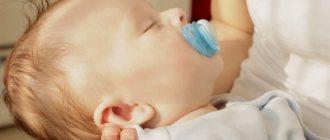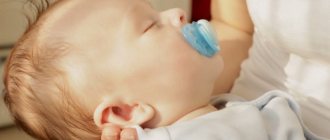Reasons for a constantly open mouth
ENT diseases are the main culprits of a child’s constantly open mouth.
Why is this habit formed? Adenoids, sinusitis, sinusitis, otitis make nasal breathing difficult. This problem sometimes remains even after removal of the pathologically enlarged nasopharyngeal tonsil. In this case, additional diagnostics are required to prevent relapse. Nasal polyps cause the child to often open his mouth (see also: nasal polyps in a child: symptoms with photos). Overgrowth of the mucous membrane is often associated with a congenital abnormality of the nasal septum or allergies. The operation eliminates the formation, but not its cause. It is necessary to promptly treat infectious diseases of the nasopharynx, preventing them from becoming chronic.
If your child's mouth is constantly open, it may be due to dental problems. Caries and deformation of tooth enamel contribute to malocclusion in a child, which leads to incorrect positioning of teeth and tongue. The baby's jaw shape changes, which leads to difficulties with nasal breathing.
INTERESTING: why does an infant constantly stick out his tongue: reasons
The problem of a constantly open mouth is often associated with finger sucking and pacifier abuse in infancy. Holding foreign objects disrupts the normal development of muscles, causing them to form according to this habit. If this condition is ignored, the child cannot close his lips, and his tongue falls out during speech.
A child's constantly open mouth is sometimes a consequence of insufficient development of the circular muscles - dense fibers that frame the lips. Reduced tone of these tissues at a young age is the norm. This problem should not be a concern, as it disappears after some time without outside intervention.
The baby's mouth may be open due to a short tongue frenulum (we recommend reading: how to determine that a child has a short tongue frenulum?). If the processes of breathing and speech are disrupted, the child gradually gets used to keeping his mouth open. The problem is easily fixed with surgery. It is necessary to carry out the surgical procedure as early as possible, before the baby develops a strong habit.
READ ALSO: Why do children cut the frenulum under the tongue?
Pathological cases are when an open mouth is accompanied by strong salivation and a protruded tongue. These symptoms indicate neurological disorders: muscle hypertonicity or severe damage to the central nervous system. It is necessary to immediately contact a specialist for diagnosis and treatment.
READ ALSO: the main causes of geographic tongue in a child
Parents may have a question: why is the child’s mouth constantly open if no pathologies have been identified? Often this manner is a consequence of an adopted bad habit.
If, for example, before the age of 5, a child did not have a deviation in the form of a constantly open mouth, then this most often indicates that the child is copying someone else’s behavior. Perhaps he is watching a baby or imitating a dog panting.
In this case, you need to monitor the child, paying attention to the time of occurrence of the disorder: whether it lasts from the first months of life or appeared recently. Perhaps it occurs only in certain circumstances, with surprise or concentration
They also take into account how the child breathes - through the mouth or nose.
READ ALSO: how to treat if a child does not have snot, but the nose does not breathe?
Dental diseases
Indeed, teeth have nothing to do with the respiratory organs, but they still force you to keep your mouth open.
This condition can lead to an increased risk of germs and poor health. In addition, it can cause dental diseases and bad breath. To solve this problem, people need to visit the dentist's office at least twice a year. In addition, it is necessary to maintain oral hygiene (brush your teeth twice a day, use dental floss).
Causes of an open mouth during sleep
If a person sleeps with his mouth open, the reasons may include difficulty breathing through the nose. As a rule, this is facilitated by allergies, adenoids, deviated nasal septum and apnea. In addition to chronic forms of diseases, there are temporary difficulties with nasal breathing - this refers to the influence of colds.
When sleeping with your mouth open, the reasons may lie in such areas as:
Respiratory disorders
The disease often occurs in adults with unresolved problems with the respiratory organs. In situations where there is nasal congestion, fever and sore throat, a person cannot breathe normally. Accordingly, you have to sleep with your mouth open.
Seasonal ARVI and such chronic forms of diseases as:
- rhinitis;
- sinusitis;
- sinusitis.
Causes mouth opening during sleep, weakness in strength and general physical malaise. A timely visit to an otolaryngologist will help correct the situation. As a preventative measure, doctors recommend annually relaxing in the mountains or on the sea coast among eucalyptus trees. The air in such an area helps to normalize the functioning of the respiratory organs and also reduces the likelihood of allergic manifestations.
Incorrect posture while sleeping
According to somnologists, people whose mouths open when sleeping do not adopt the correct posture while resting. Incorrect body positioning includes sleeping on your back. In addition, the condition is facilitated by a low pillow when the head is thrown back and the teeth open.
Patients who move restlessly in bed during sleep often end up face down. Thus, there is a slight deformation of the mouth or the nose sticking into the pillow. Subsequently, the person has to open his mouth slightly to avoid suffocation.
In view of this, a dilemma naturally arises as to what to do in this situation. Somnologists recommend performing a simple procedure at night - inspecting the bed for a comfortable location. You should lie down for a few minutes, assess the presence of discomfort and, if possible, eliminate it. Additionally, take soothing herbal tea, prevent light from penetrating through the curtains and ventilate the room. This will allow you to sleep peacefully and prevent your mouth from opening.
Weakening of the orbicularis facial muscle
Another factor that will cause your mouth to open at night is a weakening of the orbicularis muscle. As a rule, this condition is diagnosed in childhood due to the fact that the muscle in children has not yet been trained. The disease is recorded in older people. This condition occurs due to age-related changes in the loss of elasticity of muscle fibers.
Treatment of the disease begins with a visit to an ENT doctor. After studying the problem, the doctor prescribes comprehensive measures to neutralize the disease. Such measures include exercises on facial expressions and self-massage.
Problems in the field of dentistry
Dental diseases, on the one hand, do not interfere with breathing, but on the other hand, they force a person to keep his mouth open. First of all, it is not aesthetically pleasing. Secondly, the likelihood of infection with pathogenic microbes that worsens health increases. In addition, there is an unpleasant odor from the oral cavity and there is a risk of developing carious deposits.
The way out of the situation is to have annual preventive examinations with dentists. This is also true for those who do not experience pain and generally feel good. Doctors advise:
- Visit the hygiene office to clean teeth from carious stones at least 2 times a year.
- Brush your teeth correctly.
- Use rinses and other procedures prescribed by your dentist.
Neuralgic disorders
Opening of the mouth during sleep can be provoked by sluggish and not manifested symptoms of a neurological disease. Often illnesses occur in hidden forms, i.e. without showing clinical signs. However, this gives rise to an advanced form of the disease. The main symptomatic picture (especially in childhood) is a high level of saliva, a sagging tongue and an open mouth during sleep.
If such signs are detected, you should immediately make an appointment with a neurologist. As a preventive measure against neurological disorders, doctors recommend:
- reduce psycho-emotional stress;
- shares exciting problems with family and friends;
- do not refuse help;
- rationally distribute time for work and rest.
How to deal with the problem
Parents should be well aware that an open mouth while sleeping at night is not a disease. This condition can be either normal or pathological. In order to determine whether a child needs treatment, it is necessary, first of all, to find out the reason why the mouth may open and, if possible, eliminate it (for example, humidify the air in the room or remove all allergens from the nursery, open the window) . After this, the problem will resolve itself. Nasal breathing will be restored, and the child will stop breathing through his mouth.
Important! Any medication can be given to an infant only as prescribed by a doctor. Any self-medication is dangerous for the health and life of an infant.
In most cases, according to Komarovsky, changing the conditions in which the baby lives (for example, more thorough wet cleaning) helps solve the problem of difficult nasal breathing. If a baby is breastfed for up to a year, the mother should exclude all allergens from the diet so as not to provoke allergies and suffocation in the baby. Infants receiving complementary foods can only be given hypoallergenic food in strict accordance with their age.
Home climate control
In the cold season, when central heating is on in city apartments, children suffer greatly from dry air. This is expressed in significant difficulty in nasal breathing. To solve the problem, you should install a humidifier in the nursery or place a large pot of water near the baby's crib so that the moisture evaporates and makes the air more humid.
Many babies open their mouths slightly in their sleep.
Don’t panic and jump to conclusions if your 2-month-old baby periodically opens his mouth in his sleep, but breathes easily and freely. Before the age of three months, children often make unconscious grimaces during the day and night rest; this feature will subside over time.
However, in case of any respiratory disorders, you should urgently consult with doctors, because such diseases in infants develop rapidly, and the situation can quickly get out of control.
What can be done?
To normalize nasal breathing in babies, it is very important to monitor how the child falls asleep. His position should be comfortable and not cause discomfort to the baby.
The crib and pillow on which the child sleeps are of great importance. Currently, there are a huge number of different products on the market that have orthopedic effects. Sleeping on such beds not only normalizes the baby's breathing, but also helps stabilize the spine.
To normalize nasal breathing, it is imperative to clear the nasal passages of secretions. You can also use special aspirators for this purpose. You can rinse the spout with saline solution or pharmaceutical preparations. These products completely harmlessly clear the nasal passages of mucus.
If breathing problems occur in the baby due to various diseases of the ENT organs, then in this case a mandatory visit to the doctor is required. The doctor will draw up the necessary treatment regimen. It usually includes vasoconstrictor nasal drops or sprays. These remedies help relieve severe swelling, which leads to improved nasal breathing.
Nasal drops are prescribed, as a rule, for 7-10 days. If during the prescribed treatment the baby does not feel better, then the prescribed treatment regimen must be adjusted.
Allergic diseases that lead to the baby breathing through the mouth require the mandatory use of antihistamines in treatment. These remedies help normalize nasal breathing, and also relieve congestion and swelling that occurs in the nasopharynx as a result of allergic inflammation.
To eliminate unfavorable symptoms, both local therapy and tablet preparations are used. These medications are usually prescribed for 1-2 weeks.
Weaning your baby from mouth breathing is a rather labor-intensive task. To do this, you should definitely monitor his behavior. For small children, who still find it difficult to explain what such breathing can lead to, this should be turned into an entertaining game.
Many children like certain types of animals when they are children. If a child is delighted and collects cats, then you can tell him that all kittens breathe through their noses, not their mouths. Typically, this psychological technique works well for children under the age of 3-4 years.
With older children, you can already try to build a constructive dialogue. You should tell your child that you need to breathe through your nose, not your mouth. In the conversation, emphasize that this is exactly how mom and dad breathe.
You can already tell teenagers and schoolchildren what frequent breathing through the mouth can lead to. This psychological method can only be used if the baby’s nasal respiratory function is preserved.
To learn why it is dangerous for a child to sleep with his mouth open, watch the following video.
Why does a child's mouth open during sleep?
There are internal and external factors that provoke the baby's mouth to open during sleep. External - associated with the microclimate in the bedroom, dry and warm air.
Internal – with physiological disorders in the baby’s body, developing respiratory diseases.
Reasons for breathing through the mouth during sleep:
- Uncomfortable position. A newborn baby sleeps with his mouth open if his head is thrown back too much. The muscles of the neck and shoulder region are poorly developed up to 6 months of age, which leads to their hypotension, decreased tone, and increased respiratory activity through an open mouth.
- Physiological rhinitis. In babies under 3 months, the glands are not functioning properly. Therefore, an increased amount of clear mucus is released in the nose, which clogs the nasal passages and prevents normal breathing. Every second baby sleeps with his mouth open for this reason. Physiological rhinitis does not require treatment; it goes away as the mechanism of functioning of the glands on the nasal mucosa is established.
- Violation of the microclimate in the sleeping area. When the air temperature is above 18-20 degrees and the humidity is below 50%, the air in the room becomes dry and hot. In the absence of regular ventilation, it contains an increased amount of dust and contaminated particles. This causes the formation of crusts on the child’s mucous membranes, disrupts normal breathing, and forces one to breathe through an open mouth.
- Respiratory diseases. In a child, regardless of age, such diseases are accompanied by a runny nose and nasal congestion.
- Inflammation of the tonsils, adenoids. Under the influence of viruses, the baby’s adenoid system malfunctions, the tonsils become inflamed, and breathing through the nose becomes impossible, regardless of the time of day. This occurs with scarlet fever, whooping cough, measles, and diphtheria.
- Allergic reactions. In this situation, nasal congestion is observed in the child both during the day, while awake, and at night, during sleep. This is often accompanied by other symptoms: itching, watery eyes, red eyes.
- Congenital pathologies. Deformation of the nasal septum is detected in the first years of a baby’s life. If the ventilation function of the nose is impaired, the mucous membrane swells, making breathing difficult.
It is important for parents to establish the cause of mouth breathing in order to eliminate the negative factors that cause it and ensure healthy sleep for the baby.
Sleeping with your tongue hanging out
Have parents noticed that their baby can sleep with his tongue hanging out?
What is the reason for this phenomenon, is it dangerous? In fact, everything may not be as bad as it seems at first glance. Perhaps the child’s muscular system has not yet fully formed, and he cannot control his facial expressions. However, there are also dangerous diseases, such as thrush, hypothyroidism and increased intracranial pressure. Hypothyroidism develops due to iodine deficiency in the mother during pregnancy. The first signs of the disease appear at the age of three months from birth. This is a developmental delay, too large facial features, a large tongue. In this case, you need to urgently run to an endocrinologist.
Increased intracranial pressure is very rare and is very dangerous for the baby. If the doctor has made such a diagnosis, then you need to immediately begin treatment. However, this disease can be misdiagnosed in a child.
There are many reasons for a protruding tongue, and they are very harmless. Parents should closely monitor the child’s condition in order to identify abnormalities in time.
A child sleeps with his mouth open for a number of specific reasons. Although this is not unusual, many mothers become overly worried about it.
Usually newborns sleep on blue. If you do not swaddle him tightly, you can pay attention to how his arms and legs are bent. Repeating the fetal position, he pulls his legs towards his stomach and presses his hands to his cheeks
Only after six months will the baby be able to completely relax in the crib and spread his limbs to the sides.
Important! If the baby’s mouth is closed during sleep, then the air warms up and is cleared of dust in the nasopharynx, and the lungs are ventilated, and the blood is saturated with oxygen at this time. If your baby breathes through his mouth, the air coming in is too cold.
This leads to respiratory diseases. If plant pollen gets on the mucous membrane, the oral cavity will feel dry, and allergic reactions may occur.
When you see that a child is sleeping with his mouth open, take a closer look at this phenomenon and try to eliminate it. Do not listen to the stories of your relatives and friends who say that such a phenomenon is not incorrect. Such a small thing can lead to serious problems in the future. The baby may develop a bad habit of breathing through the mouth, which may result in hypoxia or anemia. While the child's mouth is slightly open, his head is thrown back. The tone of the circular muscles is thus in a weakened state, so the jaw may involuntarily drop. It is enough to place a small pillow under his head. The pillow can be replaced with a towel or sheet folded several times.
So why does a newborn sleep with his mouth open? This occurs due to a mucus-clogged nose. The baby's breathing will be difficult, and inhalation and exhalation will go through the mouth. Such children sleep restlessly, constantly cry and are nervous. When your baby breathes through his mouth, you may feel like he is choking. The fact is that breathing through the mouth is not inherent in the baby. They do not know how to switch to oral breathing in their sleep, so they will wake up and cry.
Mucus and crusts in the nasal passage appear due to the fact that dry or dirty air predominates in the room. Ventilate the room more often, do not forget to do this before going to bed without fail. During the heating season, use a humidifier. The hygiene of the child's nasal cavity must be closely monitored. The nasal passages are cleaned with cotton swabs or a syringe. Sea salt is used for this.
Important! If your child sleeps with his mouth open due to a stuffy nose, then your first priority should be measures to free up breathing. Contact your local physician who will prescribe treatment
These symptoms may occur due to acute respiratory infections or as a result of enlarged tonsils. If you follow all the doctors’ recommendations, you can significantly improve the baby’s well-being.
The problem was solved, but the baby still breathes through his mouth in his sleep? This problem can arise due to habit. If the baby is used to sleeping with her mouth open, then it is not surprising that she does not breathe through her nose even after treatment. Moms and dads will have to be patient and retrain the baby. It won't require much effort on your part. It is enough to purchase an elastic trainer or vestibular plate. Such devices are made of silicone. They allow you to normalize the muscle balance of the fringe area. They are used for one to two hours during the day or at night.
Along with this they search and read:
Should parents be alarmed?
How to wean a baby under one year old from holding hands
When a newborn breathes through his mouth in his sleep, this is a reason to consult an ENT doctor. However, you should not immediately sound the alarm. When watching your child sleep, you need to pay attention to the following points:
- how exactly does the baby breathe: through the nose or mouth;
- what is the child’s pulse: normal or rapid;
- does the baby have wheezing or coughing?
- does the baby sniffle in his sleep;
- How often does the child wake up, and what causes the awakening: hunger or discomfort.
These observations will help you know if you should be concerned about an open mouth while sleeping.
When a newborn sleeps with his mouth open, parents should listen to his breathing. Normally it should be almost silent and rhythmic. The following signs may alert you:
- whistling sounds when inhaling or exhaling;
- wheezing;
- sniffling (indicates nasal congestion);
- snoring (a healthy small child never snores).
Parents should ensure that their baby does not sleep on his back until he is three months old. At this age, respiratory arrest often occurs, leading to sudden infant death syndrome. When the baby lies on his back, he may burp or choke on mucus from the nose, so the recommended sleeping position for the baby is only on his side.
Is there any reason to worry?
There are several conditions when a person is unable to inhale and exhale air through the nose. Such conditions are caused by the active development of pathologies of the ENT organs.
- Rhinitis. When your baby sleeps with his jaw down, you need to see a doctor to rule out the possibility of respiratory pathologies. This factor can also affect a child 1 month old. A severe runny nose, making it difficult to breathe through the nose, can appear against the background of the development of adenovirus infection, influenza, or ARVI.
- Allergy. Breathing through the mouth is also provoked by the development of allergies. Under such circumstances, the child suffers from nasal congestion at night and is forced to inhale and exhale air through the mouth.
- Nose injuries. Damage to bone and cartilage tissue provokes inhibition of full nasal breathing. Most often, such difficulties are diagnosed in teenage boys. If a bruise occurs, a most dangerous injury to respiratory function can occur—a septal fracture. After this, nasal breathing is completely suppressed. In this case, its full restoration is prescribed. If you neglect treatment, it will not be possible to return to normal, undifficult breathing.
- Tonsils. Often, young children have swollen tonsils. This inflammation can be caused by many factors. This is mainly diagnosed in children who have recently had a sore throat.
- Chronic tonsillitis causes a narrowing of the airways. The long-term development of this pathology affects the appearance in the child of symptoms of respiratory failure associated with the occurrence of oxygen starvation of tissues.
- Polyps. An increase in the size of polyps can lead to respiratory dysfunction, since these neoplasms can inhibit nasal breathing. Their rapid increase is diagnosed in children with reduced immunity or ENT pathologies. According to statistics, nasopharyngeal polyps are mainly diagnosed in children 5-12 years old. The main reason for the appearance of polyps is considered to be heredity.
- Adenoids. Schoolchildren begin to inhale and exhale air through their mouths due to enlarged adenoids. In this case, the growth of adenoid tissue in the nasopharyngeal area is typical over a couple of years.
- Sinusitis and sinusitis. Symptoms of pathologies of the paranasal sinuses can interfere with the normal breathing of babies over 3 years old. This sign of pathology can occur in children suffering from a long course of chronic sinusitis or sinusitis. Such pathologies are also characterized by the occurrence of severe nasal congestion.
What to do?
If you notice that your newborn often or always sleeps with his mouth open, consult your pediatrician as soon as possible. Reading Komarovsky's articles and advice from experienced mothers does not replace the need to visit specialists.
- It may be quite enough to change the baby’s sleeping position by placing a diaper folded several times under the head.
- Physiological rhinitis can be treated by rinsing the nose with saline and removing excess mucus using an aspirator.
- To eliminate the problem, you may need to adjust the microclimate in the nursery: ventilate it more often, carry out wet cleaning, empty the room of soft toys (they accumulate dust), create an optimal temperature - about 20 degrees.
- If the cause of improper breathing is a disease, in addition to rinsing the nose with saline, the doctor may prescribe vasoconstrictors.
- For a bacterial or viral infection, a specialist will prescribe appropriate therapy.
- If nasal swelling is caused by allergies, medications will be used to eliminate the symptoms of this disease, and a diet may be prescribed. Often allergies are caused by pets, in which case you may need to get rid of them.
anonymously
Hello, my child is 2 years and 1 month old. Two weeks ago I started having a severe runny nose. They identified him in 3 days. We washed Humer (salt water) and oil drops (there are 3 types of oils from the pharmacy). We visited the family doctor, he said my throat was a little reddish, since we are allergic to Hexoral, we use a nebulizer and just sodium chloride. But the nose still doesn’t breathe, the child breathes more and more through his mouth, even if I wash the nose, there is almost no snot. Here my feet were soaked in mustard for three days, there was no effect. I’m very worried, I should probably contact an ENT specialist, but in Estonia we have waiting lists for 2 months. Tell me, what could it be. I’ll still try to make an appointment with Laura as soon as possible, maybe there’s a paid appointment.
Hello. The most common cause of this condition in children is hypertrophy of the adenoids and/or palatine tonsils. Please read the article about adenoids on our website: https://www.intac.ru/state/AH:-1.200013785147/ I will be glad to answer your questions. I, of course, recommend making an appointment with an otolaryngologist. It is very difficult to give recommendations without an examination. Health to you and your baby.
anonymously
We still made an appointment with an ENT specialist for a fee, they did an x-ray and discovered second-degree adenoids. They told us to take Nasonex, but it gave us allergies. I took the drops for 3 days. Xemelini’s nose began to breathe well. We are now still dripping protargol for 5 days. He breathes during the day only through his nose and at night, too, only when he turns over from side to side in his sleep, as if his nose is clogged for a minute, and then he breathes well again. On the 12th we will go to the ENT specialist again. I read that Sofradex helps well with adenoids, they brought it to me from St. Petersburg. I’ll ask the ENT specialist if we can have it? Do you think we should remove the adenoids or not, we don’t have a runny nose, very rarely, at night he breathes through his nose. The only thing that confuses me is that the ENT said that we have depressed eardrums. And do we need Sofradex? And what kind of prevention can be done for adenoids, do we have an inhaler?
Sofradex - eye and ear drops, not intended for the nose (no official indications). Adenoids are medium in size. It is not the adenoids themselves that should be treated, but the inflammation when it exists: a runny nose, or sinusitis, adenoiditis. If simple measures help - xymelin and protargol, then why look for other means? “Depressed eardrums” - apparently retracted, a sign of inflammation of the auditory tube extending into the nasopharynx. Your letter today does not raise much concern about complications. For “depressed membranes,” the usual remedy is to wait and watch. There is no prevention for adenoiditis. Nasonex is often prescribed for adenoid hypertrophy, but recently it has become clear that it only helps while it is being used, then the difficulty in nasal breathing is restored to its previous level. It might be worth watching in your case. Success and health.
How to react to the fact that a newborn opens his mouth in his sleep? You should pay attention to the general condition of the baby and, in case of a cold, consult a doctor. If the baby was born healthy and feels well, there may be no problems for concern
It is important to prevent chronic diseases and start treatment on time
Disadvantages of mouth breathing
There are many epithelial cells on the nasal mucosa; on their outer surface there are a large number of tiny cilia. These cilia are necessary to trap small particles of dirt and dust, so they do not enter the body. If an infant rests with his mouth open, then the inhaled air cannot fully heat up and, in a cooled state, enters the respiratory system through the respiratory tract. Because of this, children develop various diseases of the ENT organs. Those toddlers who constantly breathe through their mouths often suffer from laryngitis, pharyngitis, and they are more likely to get bronchitis.
When a father or mother notices this condition in their child, they should take the baby to the pediatrician. Unfortunately, many diseases occur in childhood without additional symptoms and clinical signs, and mouth breathing is a signal that a small body needs medical help.
If a child breathes through his mouth outdoors, the likelihood of contracting any colds increases many times over. Statistics show that those children who live in large industrial cities are much more likely to have certain diseases of the respiratory tract and organs. In addition, if freezing air enters children's lungs in winter, this can lead to an inflammatory process and even the development of pneumonia.
What is the danger
It is important for a child to breathe through his nose. When feeding, it is physiological to inhale air through the nose when the mouth swallows milk.
Even when falling asleep in this position with your mouth open, nasal breathing continues.
Reasons explaining the importance of proper breathing:
- As cold air passes through the nasal passages, it heats up. This protects the throat and bronchi from colds.
- Dust and pollen, settling on the hairs in the nose, do not enter the body. The child is protected from asthma and allergic reactions.
- Most of the bacteria that cause respiratory diseases die in the nasal passages.
- When breathing through the nose, the blood is better saturated with oxygen.
By breathing through his nose, the child protects himself from external dangers and diseases.
About thermometers
In recent years, inventions have come quite far, and measuring body temperature has become a matter of just a couple of seconds. So, for quite a long time there have been dummy thermometers designed specifically for measuring temperature in infants. Measuring with such a pacifier takes only 10-20 seconds.
For older children, starting from six months, you can use regular electronic thermometers. Most of them are multifunctional, that is, they can be placed as usual - under the arm, such a measurement takes 20 seconds.
For a quicker measurement, you can place the tip of the thermometer under the baby’s tongue. These thermometers have a soft body and are protected from moisture. This measurement takes only 10 seconds.
Many new mothers have already encountered non-contact thermometers in the maternity hospital. To measure body temperature with such a device, it is enough to point the beam at the baby’s forehead for a couple of seconds, and the data will be obtained. Such a thermometer costs several times more than its conventional electronic counterparts, but with frequent use it more than pays for itself.
If the temperature is higher than normal, it means the baby has a cold, you need to call a doctor at home. If the temperature is above 38 degrees, you need to call an ambulance or take responsibility yourself and give your baby an antipyretic. This could be paracetamol syrup or Nurofen.
If the temperature is normal, but on subsequent nights the child sleeps with his mouth open again, you should think about the reason.
Why does a newborn sleep with his mouth open?
Not all parents know why a baby’s mouth may open during sleep, and why the baby breathes through its mouth.
Hydrocele of the testicles in newborn boys - what is it, symptoms and treatment
If a child sleeps with his mouth open, there can be many reasons. Most often, this condition is caused by the following features:
- naturally narrow nasal passages (which happens quite often in babies);
- physiological rhinitis of newborns, caused by the child’s adaptation to the outside world;
- runny nose caused by acute respiratory disease or allergies;
- difficulty breathing due to upper or lower respiratory tract disease (laryngitis, bronchitis, pneumonia);
- elevated body temperature.
The first two reasons do not require medical attention and do not have a negative impact on the health and well-being of the baby.
Congenital anomalies
Sometimes sleeping with your mouth open is caused by a congenital deviated nasal septum. In this case, the child may need surgery. However, such a congenital anomaly is quite rare. Most often, opening the mouth during night and daytime rest is caused by other reasons.
Attention! Young children often have stridor - noisy breathing with wheezing and whistling while feeling normal. This condition is not dangerous, but requires consultation with a pediatrician.
The cause of the problem has been eliminated, but the baby is breathing through his mouth
It happens that the provoking factor in the form of a disease or allergy is eliminated, and breathing is carried out through the mouth. The baby does not remember how to breathe correctly. Inhalation of air through the mouth does not occur at night, not during rest - constantly. The task of parents is to teach the baby to breathe. For this purpose, special devices have been developed - trainers. The soft silicone base prevents injury to the mucous membrane. The trainer restores the functioning of the muscles of the nasolabial triangle.
List of used literature:
- Bishop DV, Anderson M, Reid C, Fox AM; Anderson; Reid; Fox (2011). Koenig, Thomas, ed. “Auditory development between 7 and 11 years: an event-related potential (ERP) study.” PLoS ONE
- Hu Z, Chan RC, McAlonan GM; Chan; McAlonan (2010). “Maturation of social attribution skills in typically developing children: an investigation using the social attribution task.” Behavioral and Brain Functions
- Stiles J, Jernigan TL; Jernigan (2010). “The basics of brain development.” Neuropsychology Review
What should parents do?
A baby's healthy sleep is uniform, calm snoring through his nose. Sleeping with your mouth open can cause health problems in the future. If parents do not wean their mature child from this bad habit, he or she is at risk of developing anemia and sleep disorders. In addition, breathing through the mouth leads to the fact that the infant inhales dust that flies in the air, and it passes into the respiratory tract without any problems.
So what should parents do in such a situation? To begin with, you should not give in to panic and calm down, because nothing terrible or bad happened. It is necessary to listen carefully to the baby's breathing. If he breathes evenly and through his nose, then this is a good healthy sleep, and his mouth is open simply from his sleeping position. So there is no reason to see a doctor. But if your baby constantly sleeps with his mouth open, then you need to consult a pediatrician.
Dangerous reasons for a child to sleep with half or fully open eyes
From the age of two, a child’s sleep should be the same as that of adults. If, after a phase of superficial dozing, he continues to sleep with his eyes half-closed
, you should not postpone a visit to the pediatrician, as this may be a sign of:
- shortened eyelids;
- lagophthalmos, exophthalmos and other ophthalmological diseases;
- disorders of the nervous and/or endocrine system;
- somnambulism (“sleepwalking”);
- brain damage;
- development of oncology.
The earlier the pathology is identified, the higher the chances of its elimination.










